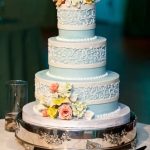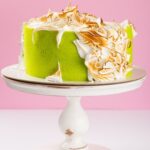Are you looking for a fun and creative way to decorate your cookies? One delicious option to consider is using cake frosting. In this article, we will guide you through the process of how to use cake frosting to decorate cookies, from choosing the right type of frosting to adding colorful designs for a visually stunning result.
When it comes to decorating cookies with cake frosting, there are various options to choose from, including buttercream, royal icing, and fondant. Each type of frosting offers unique textures and finishes that can elevate the appearance of your cookies. Whether you prefer a smooth and creamy buttercream or a crisp and glossy royal icing, we will explore the characteristics of each to help you decide which one suits your decorating style best.
Before diving into the decorating process, it is important to have the right tools and materials on hand. From piping bags and tips to food coloring gels and edible decorations, having a well-equipped workspace will make the decorating experience more enjoyable and efficient. Stay tuned as we provide a detailed list of essential items needed for successfully using cake frosting to decorate cookies.
Types of Cake Frosting
When it comes to using cake frosting to decorate cookies, there are several options to consider. Each type of frosting has its unique characteristics and is suitable for different decorating techniques. The most common types of cake frostings used for decorating cookies include buttercream, royal icing, and fondant.
Buttercream frosting is a popular choice for cookie decorating as it is easy to work with and versatile. Buttercream can be piped onto cookies to create intricate designs or spread smoothly for a simple yet elegant look. It is also great for adding texture and dimension to your cookie decorations.
Royal icing is another popular choice for decorating cookies, especially when intricate designs or detailed patterns are desired. Royal icing dries hard, making it ideal for creating elaborate decorations that can be stacked or stored without smudging. This type of frosting is perfect for flooding cookies with a smooth finish or outlining designs for a more polished look.
Lastly, fondant can be used to decorate cookies for a sleek and professional finish. Fondant can be rolled out and cut into various shapes to create unique designs or cover the entire surface of the cookie for a clean canvas. While fondant may take some practice to get the hang of working with, the results are well worth it in terms of professional-looking decorated cookies.
Tools and Materials Needed
Baking Essentials
Before you dip your toes into the world of cookie decorating with cake frosting, make sure you have all the necessary tools and materials. In addition to your favorite cookie recipe and baked cookies, you will need basic baking supplies such as a rolling pin, cookie cutters, parchment paper, and a baking sheet. Having these items ready will ensure a smooth decorating process without any last-minute runs to the store.
Frosting Tools
To achieve professional-looking designs on your cookies, invest in some key frosting tools. A piping bag with different tips is essential for creating intricate designs and details on your cookies. Additionally, offset spatulas come in handy for spreading frosting evenly over larger surfaces. If you plan to work with royal icing or fondant, consider getting a set of food-safe brushes for painting on designs or adding delicate details.
Decorative Materials
In addition to frosting tools, having decorative materials on hand can elevate your cookie decorating game. Edible glitter, sprinkles, colored sugar pearls, and edible markers can all be used to add texture and dimension to your frosted cookies. These extra touches can turn simple cookies into stunning works of art that are sure to impress friends and family.
Don’t be afraid to experiment with different combinations of decorations to create unique designs that showcase your creativity. Remember that practice makes perfect when it comes to mastering the art of using cake frosting to decorate cookies.
Preparing the Cookies
When it comes to decorating cookies with cake frosting, the first step is to ensure that you have perfectly baked and prepared cookies as your canvas. The quality of the cookies will greatly affect the overall outcome of your decorated treats. To achieve the best results, follow these tips on baking and preparing the cookies before diving into the fun part of decorating:
Baking Tips
Before you start decorating, make sure your cookies are completely cooled. Warm cookies can cause the frosting to melt or become runny, impacting the design and overall appearance of your decorated cookies. Additionally, bake your cookies until they are just set but not overly browned to avoid any unwanted flavors or textures.
Cookie Preparation
Once your cookies have cooled, it’s essential to prepare them for frosting. If you find that your cookies have any rough edges or imperfections, gently sand them down with a fine-grit sandpaper. This will create a smooth surface for the frosting to adhere to. Additionally, be sure to clean off any excess crumbs from the surface of the cookie before applying frosting for a clean and professional finish.
Cookie Shape and Size
Consider the shape and size of your cookies when planning out your decoration designs. Larger cookies may allow for more intricate designs and details, while smaller cookies may benefit from simple but bold decorations. Choose cookie shapes that align with the theme or occasion you are decorating for, whether it’s hearts for Valentine’s Day or trees for Christmas celebrations.
By following these tips on baking and preparing your cookies before decorating with cake frosting, you’ll set yourself up for success in creating beautifully decorated treats that are sure to impress both visually and tastefully. Now that your cookies are ready, it’s time to move on to learning various techniques on how to use cake frosting to decorate them creatively.
Decorating Techniques
When it comes to using cake frosting to decorate cookies, there are various techniques that can elevate your cookie decorating game. One popular method is piping, which involves using a piping bag or tool to create intricate designs on the cookies. Piping allows for precise lines and details, making it perfect for decorating sugar cookies with ornate patterns or writing personalized messages.
Another technique commonly used in cookie decorating is flooding. Flooding involves filling in larger areas of the cookie with a smooth layer of frosting to create a base for further decorations. This method is ideal for creating colorful backgrounds or adding a solid layer of frosting before adding more intricate details on top. By mastering flooding technique, you can achieve professional-looking results that are sure to impress.
In addition to piping and flooding, outlining is another important decorating technique that can take your cookie creations to the next level. Outlining involves creating defined borders or shapes using a thicker consistency of frosting, which helps keep the design intact and adds dimension to the decoration. Whether you’re outlining the edges of a cookie or creating intricate designs within the cookie surface, this technique enhances overall visual appeal and gives your decorated cookies a polished finish.
| Technique | Description |
|---|---|
| Piping | Create intricate designs on cookies using a piping bag or tool for precise lines and details. |
| Flooding | Fill in larger areas of cookies with smooth frosting layers for colorful backgrounds or base decorations. |
| Outlining | Create defined borders or shapes with thicker frosting consistency to add dimension and enhance overall design. |
Adding Colors and Designs
Another creative way to add colors and designs to your cookie frosting is by using edible markers or food-safe paint brushes. These tools allow you to draw intricate patterns, write personalized messages, or even create mini works of art on your cookies. Edible decorating pens come in a variety of colors, making it easy to add details and accents to your frosted cookies.
If you want to get even more innovative with your cookie decorations, consider using sprinkles, edible glitter, or tiny fondant shapes. These embellishments can add texture and depth to your frosting designs, making your cookies stand out from the rest. Simply sprinkle them over the freshly frosted cookies or gently press them into the frosting for a festive touch. Experimenting with different colors and designs will allow you to showcase your creativity and give each cookie a unique look.
In addition to traditional decorations, you can also try special techniques like marbling, ombré effects, or airbrushing with edible sprays. These advanced methods require some practice and patience but can result in show-stopping cookie creations. Don’t be afraid to mix colors, play around with different tools, and let your imagination run wild when decorating cookies with cake frosting – the possibilities are endless.
Troubleshooting Tips
When decorating cookies with cake frosting, it’s important to be prepared for potential challenges that may arise during the process. Here are some common issues that you may encounter and ways to troubleshoot them:
- Problem: Frosting is too runny
- Problem: Frosting is too thick
- Problem: Colors are bleeding into each other
If your frosting is too runny and not holding its shape when piped, try adding more confectioners’ sugar a little at a time until you reach the desired consistency. Alternatively, you can refrigerate the frosting for a short period to help it firm up before using it.
On the other hand, if your frosting is too thick and difficult to pipe or spread, thin it out by adding a small amount of milk or water until you achieve the right consistency. Be sure to add liquid sparingly to avoid making the frosting too thin.
If you’re layering different colors of frosting and they’re bleeding into each other instead of staying separate, allow each color to dry completely before adding the next layer. You can also use a toothpick to gently swirl the colors together for a marbled effect if desired.
By being aware of these common issues and knowing how to address them effectively, you can confidently use cake frosting to decorate cookies without feeling discouraged by any unexpected challenges along the way. Experiment with different techniques and don’t be afraid to get creative with your designs.
Storage and Display
When it comes to storing decorated cookies, it’s important to consider how to preserve both the flavor and appearance of your creations. The key is to store them properly to ensure they remain fresh and beautiful for as long as possible. One common method is to place the decorated cookies in an airtight container lined with wax paper or parchment paper. This helps prevent the cookies from drying out while also protecting the frosting decorations.
Another useful tip for storing decorated cookies is to separate different designs or colors with layers of wax paper within the container. This can help prevent the colors from bleeding into each other or smudging, keeping each cookie looking pristine. Additionally, you can add a slice of bread or a small piece of apple to the container to help maintain moisture and freshness in the cookies.
When it comes to displaying decorated cookies for special occasions, there are numerous creative ways to showcase your edible works of art. You can arrange them on decorative trays or platters, using props like ribbons, flowers, or themed ornaments to enhance the presentation.
Another fun idea is to hang decorated cookies on a festive garland or cookie tree for a unique and eye-catching display. Whether it’s a birthday party, holiday gathering, or wedding celebration, presenting your decorated cookies thoughtfully and creatively can make them even more appealing to guests.
| Storing Decorated Cookies | Displaying Decorated Cookies |
|---|---|
| Place in airtight container with wax paper | Arrange on decorative trays or platters |
| Separate designs/colors with wax paper | Use props like ribbons or flowers |
| Add bread/apple slice for moisture | Hang on festive garland/cookie tree |
Conclusion
Decorating cookies with cake frosting is a fun and creative way to add a personal touch to your baked goods. Whether you are an experienced baker or just starting out, using cake frosting to decorate cookies can be a rewarding and enjoyable experience. By following the tips and techniques outlined in this article, you can create beautifully decorated cookies that are sure to impress your friends and family.
Experimenting with different types of cake frosting, such as buttercream, royal icing, or fondant, allows you to achieve various textures and finishes on your cookies. From simple outlines to intricate designs, the possibilities for decorating cookies with cake frosting are endless. With the right tools and materials at hand, you can easily bring your cookie decorating ideas to life.
Remember, practice makes perfect when it comes to decorating cookies with cake frosting. Don’t be afraid to try new techniques and experiment with colors and designs. If you encounter any issues along the way, refer back to the troubleshooting tips provided in this article.
So go ahead, gather your supplies, prepare some delicious cookies, and start exploring how to use cake frosting to decorate cookies for yourself. The results will be not only visually appealing but also a delightful treat for your taste buds.
Frequently Asked Questions
Can You Use Betty Crocker Frosting to Decorate Cookies?
Betty Crocker frosting can be used to decorate cookies by applying it with a piping bag or spatula to create unique designs and patterns. The consistency of the frosting allows for easy spreading and decorating.
How Do You Turn Store Bought Frosting Into a Glaze?
To turn store-bought frosting into a glaze, simply warm it up in the microwave for a few seconds until it becomes more liquidy. You can then drizzle the glaze over baked goods like cakes, cookies, or pastries for a glossy finish.
Can You Make Store Bought Frosting Harden?
It is possible to make store-bought frosting harden by chilling the frosted baked goods in the refrigerator for some time. The cold temperature helps the frosting set and become firm, making it easier to handle and transport without smudging or melting.

Welcome to my blog about home and family. This blog is a place where I will share my thoughts, ideas, and experiences related to these important topics. I am a stay-at-home mom with two young children. I hope you enjoy reading it! and may find some helpful tips and ideas that will make your home and family life even better!





